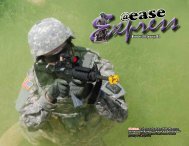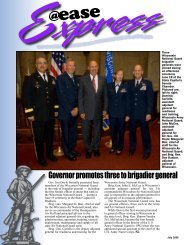At Ease - Wisconsin National Guard Department of Military Affairs
At Ease - Wisconsin National Guard Department of Military Affairs
At Ease - Wisconsin National Guard Department of Military Affairs
You also want an ePaper? Increase the reach of your titles
YUMPU automatically turns print PDFs into web optimized ePapers that Google loves.
civvies, some just out <strong>of</strong> last spring’s high school class. They<br />
gazed self-consciously at the heels <strong>of</strong> the men in front, their own<br />
uniforms stacked and waiting in warehouses down south.<br />
Most <strong>of</strong> the men managed to compose themselves as befits<br />
soldiers embarking upon serious business, but a few hopeless<br />
amateurs beamed into the crowd, and others snuck occasional<br />
glances, seeking eye contact with a fellow shoemaker from<br />
Thorogood or veneer maker from Roddis, a girlfriend, a younger<br />
brother.<br />
Young men’s options fading<br />
The options open to single, healthy young men were fading<br />
fast.<br />
Tomorrow, men between 21 and 35 years <strong>of</strong> age were to<br />
report to fire stations and schoolhouses across the nation to<br />
register for the draft.<br />
Sooner or later nearly all the men lining the streets <strong>of</strong><br />
Marshfield would have to choose — Army, Navy, Air Corps, or<br />
the local <strong>National</strong> <strong>Guard</strong> units. And within days that last option<br />
would be gone.<br />
The <strong>Guard</strong> was being activated — the first great influx into<br />
an army just coming alive after 20 years. There would be no more<br />
hometown units to join, just the great body-processing system on<br />
the federal level.<br />
But tonight belonged to those who had already made their<br />
choice.<br />
A week ago, formal notification had finally come from<br />
Washington, and representatives <strong>of</strong> all the civic clubs in town<br />
gathered at the firehouse to plan the send-<strong>of</strong>f gala. <strong>At</strong> eight this<br />
morning the unit was <strong>of</strong>ficially inducted into the Army. No longer<br />
were they Marshfield’s Company C. As <strong>of</strong> this day they were C<br />
Company, 1st Battalion, 128th<br />
Infantry Regiment, 32nd<br />
Division, United States Army.<br />
Grim news<br />
News from all over was<br />
grim that month. Kids were<br />
dying from polio. Al Capone<br />
was seen cruising the streets<br />
<strong>of</strong> Hurley, Wis., in the back<br />
<strong>of</strong> a big sedan. Cowboy actor<br />
Tom Mix was killed in an auto<br />
accident near Florence, Ariz.<br />
News from overseas<br />
was less lurid but far from<br />
encouraging. Ever since the<br />
Japanese signed the Tripartite<br />
Pact, allying themselves<br />
with Hitler and Mussolini,<br />
Americans had been packing<br />
up to leave the Far East. Both<br />
the Navy and Standard Oil<br />
were forbidding employees<br />
from bringing families to<br />
Asia. Church groups called in<br />
their missionaries. Offices <strong>of</strong><br />
steamship lines in Shanghai<br />
were swamped with Americans<br />
eager to get out.<br />
On the other side <strong>of</strong><br />
the world, the Battle <strong>of</strong> Britain was over but the Blitz was on.<br />
Frustrated in his attempt to destroy England’s air force, Hitler’s<br />
deputy, Hermann Goering, turned his attention to London. If he<br />
could not break the British sword, he would go for the heart and<br />
guts.<br />
Beginning Sept. 7 an average <strong>of</strong> 200 German bombers made<br />
nightly runs over London, 57 continuous nights <strong>of</strong> fire bells and<br />
ambulances, <strong>of</strong> endless hours in crowded basements and subways,<br />
<strong>of</strong> emerging at daybreak into smoke, rubble and flooded streets.<br />
The only good news from England was that invasion was no<br />
longer possible, at least not this year.<br />
U.S. President Franklin Roosevelt and his challenger in the<br />
election next month, Wendell Willkie, repeatedly told the nation<br />
the U.S. would not become involved in war, but evidence <strong>of</strong> our<br />
growing military strength was apparent in every community and<br />
cast a shadow over their assurances.<br />
In <strong>Wisconsin</strong>, hundreds <strong>of</strong> big Army trucks were rolling <strong>of</strong>f<br />
assembly lines in Janesville. Briggs and Stratton and the J. I.<br />
Case plants in Milwaukee were turning out millions <strong>of</strong> dollars<br />
worth <strong>of</strong> artillery shells. The Peterson Boat Works in Sturgeon<br />
Bay was making motor launches for the Navy. Woolen mills in<br />
Chippewa Falls and West Bend were weaving blankets for the War<br />
<strong>Department</strong>.<br />
Across the country dance bands were playing “There’s<br />
Something About a Soldier,” and indeed, after two decades in the<br />
shadows, the soldier was back in the limelight. For young <strong>Guard</strong><br />
members it was a heady experience.<br />
Milwaukee songs, tears<br />
In Milwaukee, the 160 men <strong>of</strong> Company K, 127th Infantry,<br />
a Polish-American outfit from the South Side, went on stage<br />
If one enlisted man can peel 50 spuds an hour, then three enlisted men can peel...well, quite a few.<br />
Kitchen police duty, ‘KP’ for short, was a staple <strong>of</strong> military life.<br />
March 2009 31





